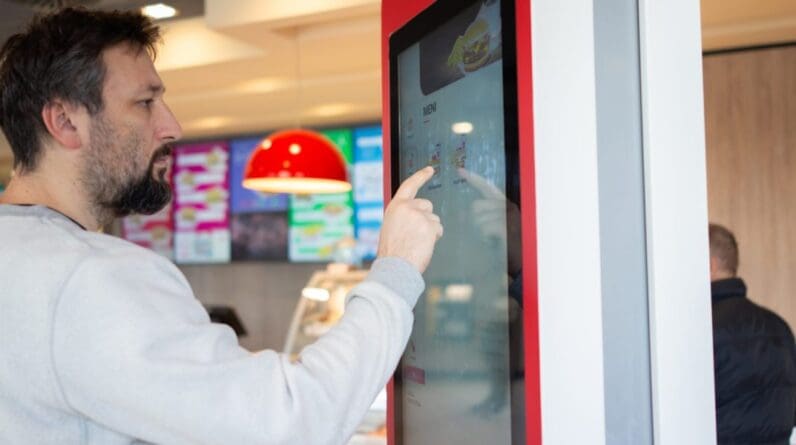
Trying hard to stay afloat in a restaurant industry spending 36% of its cash on labor and with minimum wage creeping to $16, a cadre of local New York City chains have found a shrewd way to save: enlisting the help of cashiers video calling in from the Philippines and paying them way less.
At Sansan Chicken, a fried-chicken joint in the East Village and Long Island City, cashiers on a large screen greet customers and answer questions they may have about the menu or their self-service kiosk. They take UberEats orders over the phone to take the pressure off each location’s handful of in-person employees. And for their efforts, they get paid about just a handful of dollars every hour.
The staffing firm behind this technology is Happy Cashier, a New York-based company that is testing its product on a handful of local businesses. The company, led by founder and partner Chi Zhang, wants to “empower small businesses by providing exceptional virtual cashier services, as well as operational assistance,” Zhang told Fortune.
Zhang’s company draws most of its labor from a massive well of 1.3 million Filipino workers employed through the country’s business process outsourcing (BPO) industry, which is the largest in the world and generated $35.4 billion in revenue in 2023.
The business, which has been operating in Sansan Chicken since last October, is also in its pilot stages at Sansan Ramen and a couple Yaso Kitchen locations, as well as in another local chain that Zhang did not disclose the name of. Zhang, who actually used to own a Yaso Kitchen operation, identified worker productivity as a part of business that could use a tune-up.
The impetus for the business came from Zhang’s own retail experience. After opening a restaurant in downtown Brooklyn in 2015, he ended up closing the location during the pandemic in part because of how difficult it was to hire workers. Indeed, Zhang’s story is a common one for restaurateurs: COVID-era fast-food labor shortages are what pushed chains like Chipotle and Sweetgreen to turn toward implementing automation in stores. But the use of technology can be more than just a saving grace for struggling businesses, Zhang argued.
Happy Cashiers speak “perfect English” and have helped take the pressure off in-person workers—whose jobs have not been eliminated since the introduction of the video-calling service—by picking up UberEats calls and answering customers’ questions while employees physically in the store prepare orders. The help from Happy Cashier has successfully “increased operational efficiencies,” Zhang said.
Of course, this service means very little unless it helps the bottom line. Zhang was transparent about using outsourced labor to cut down on costs: “I simply cannot avoid discussing this topic,” he said. “The cost is admittedly cheaper than the U.S.”
Though he didn’t disclose Happy Cashier’s wages, Zhang said, “We pay 150% more than the average cashier job in the Philippines,” which, according to Indeed, is 56.69 Philippine pesos, or about $1, per hour as base pay. Using Zhang’s approximation, Fortune calculated that Happy Cashier employees would make $2.50 hourly—150% more than the $1 converted average. Happy Cashier did not respond to Fortune’s request to clarify the salary situation, but these wages are on top of tips that are split between in-person and virtual employees. Each restaurant owner determines the exact tipping system.
“We discuss with the owners, ‘How do you want it distributed?’ and make sure there’s a very fair amount evenly distributed to the people working based on time and energy put into the operations,” Zhang said.
In some cases, this means that tips are split 60/40, with most of the cash going to in-person workers. Zhang said workers seem fine with the arrangement.
“We didn’t have any objections since that process was enacted,” he said.
The company’s practice of outsourcing labor may be part of a growing practice of leveraging technology in the workplace, though not one without controversy. Canadian fast-casual chain Freshii used a video-calling system called Percy in 2022, paying its remote workers based in Nicaragua $3.75 per hour, even though Ontario’s minimum wage is $16.55. Though an investigation by the Toronto Star on the company’s wages drew criticism and Freshii discontinued Percy in August 2023, it didn’t do so for legal reasons. It attributed the change to a change in ownership.
“It’s just like any other kind of outsourcing,” employment lawyer Jonathan Pinkus told the Star. “If you’re sending jobs to people in a different country, you’re only obligated to comply with the labor standards of that country. Being virtually present in Ontario doesn’t change that.”
Happy Cashier, a business that has no website and isn’t even officially on the market, is already seeing success. Zhang said the company has a couple dozen prospective customers who heard of him through word of mouth. He plans to introduce the service to the market by the end of June.
“Like the name Happy Cashier, [my goal] is to bring my customer happiness, confidence, and sustainable growth,” he said.







